Buying Solar Panels: What You Need To Know
Last Updated: 16th Jun 2025 By Finn Peacock, Chartered Electrical Engineer, Fact Checked By Ronald Brakels
If you’ve landed here after Googling “solar panels”, you’re probably wondering:
- “Are they still worth it?”
- “What’s a good system cost these days?”
- “What are the good brands?”
You’re right to ask. Some solar sales tactics are dodgy. Feed-in tariffs aren’t what they used to be. And yes – some panels are absolute crap.
We’re not going to name the worst offenders (life’s too short to deal with cease-and-desist letters), but if you stick to the well-known, recommended brands we highlight — you’ll avoid the lemons.
This page is here to give you straight answers to the following questions:
- Are Solar Panels Still Worth It in 2025?
- How Much Do Solar Panels Cost?
- What’s the Difference in Price between Cheap and Expensive Solar Panels?
- What’s The Deal With The Solar Panel Rebate?
- Is A Battery Necessary or Overkill?
- Specifications That Matter: Efficiency, Degradation, PMax
- Solar Panel Warranties
- Country of Origin: Are Chinese Panels Crap?
- Which Budget Solar Panel Brands Are Reliable?
- How Many Solar Panels Do I Need?
- Do I Need A Battery Too?
- Is My Roof Suitable?
- What Will Solar Panels Look Like On Your Roof?
- How Long Do Solar Panels Last?
- How Green Are Solar Panels?
- Can Solar Panels Be Recycled?
- What Maintenance / Cleaning Do They Need?
- What Are The Best Solar Panels in 2025 according to Aussie Installers?
- FAQs
Are Solar Panels Still Worth It in 2025?
Let’s start with the bit most solar websites leave out: Not everyone should get solar.
Here are some signs it might not be worth it — or at least not yet:
- You’re never home during the day and you barely use any power on weekends either
- Your roof is heavily shaded
- You rent
- You’re planning to sell in the next year
- Or — let’s be blunt — you’re not expecting to live too much longer and have zero interest in lowering bills for whoever inherits the house…
If one or more of those apply to you, fair enough. Solar might not be a smart move right now.
But For Everyone Else…
Most of your solar savings will depend on three factors:
- How much sun falls on your roof (location, roof size/direction, and local shading)
- How much electricity you use during the day (even if you are out most weekdays, modern Aussie homes use a surprising amount of electricity even when empty – and of course over the weekends)
- How much you pay for electricity and how much you’ll get paid for exporting surplus solar back to the grid
If all three line up, your payback can be as low as 2.5 to 3 years. In the worst case, it might stretch to 7–9 years.
The good news: in 30 seconds you can get a good, honest estimate of YOUR savings with our Solar Calculator and decide if it’s worth it.
How Much Do Solar Panels Cost?
Obviously this depends, but here’s a real-time graph of what 9805 Aussies have paid for solar panels since 2023 (as reported to this site). The average is about $8,500 per installation, with prices trending downward.
Average Price Australian Homeowners Paid For Their Solar Since April 2023
Price varies based on:
- System size (number of panels)
- Location (metro vs. rural, state differences)
- Hardware quality (cheap vs. good-budget vs. premium brands)
Our Price Explorer lets you filter these variables to see typical pricing.
One of the biggest variables is the quality of the installation company. You will pay more for a better installation.
A very general rule of thumb: expect around $1,000 per kW for a solid system (~$6,000 for 6 kW, $10,000 for 10 kW).
You will see really cheap solar advertised as low as $500 per kW and a high-end solution for as much as $1,200 per kW.
So, when comparing quotes for a standard 10 kW system, here are some things to consider:
| Quotes for 10 kW system | Super Cheap | Budget | Average | Expensive |
|---|---|---|---|---|
| Price Range | Below $5,000 | $6,000-$7,500 | $9,000-$10,000 | $12,000 |
| Overview | A cheap system and reliability may become an issue | A budget system you hope is reliable | Good components installed by a reputable company | The best quality panels and installation |
| Panels | Check if the panels are CEC-approved | Check if the panels are CEC-approved | Approved ‘middle-of-the-range’ panels | Highly efficient & long-lasting panels |
| Warranties | Will your company be around to honour the warranty? | Unlikely to be the best warranty | Competitive | Highly competitive |
| Installation | Is your installer SAA-accredited? | Will the installer still be around in 5 years? | Is an entire system warranty provided? | Performed by a highly reputable company |
What’s the Difference in Price between Cheap and Expensive Solar Panels?
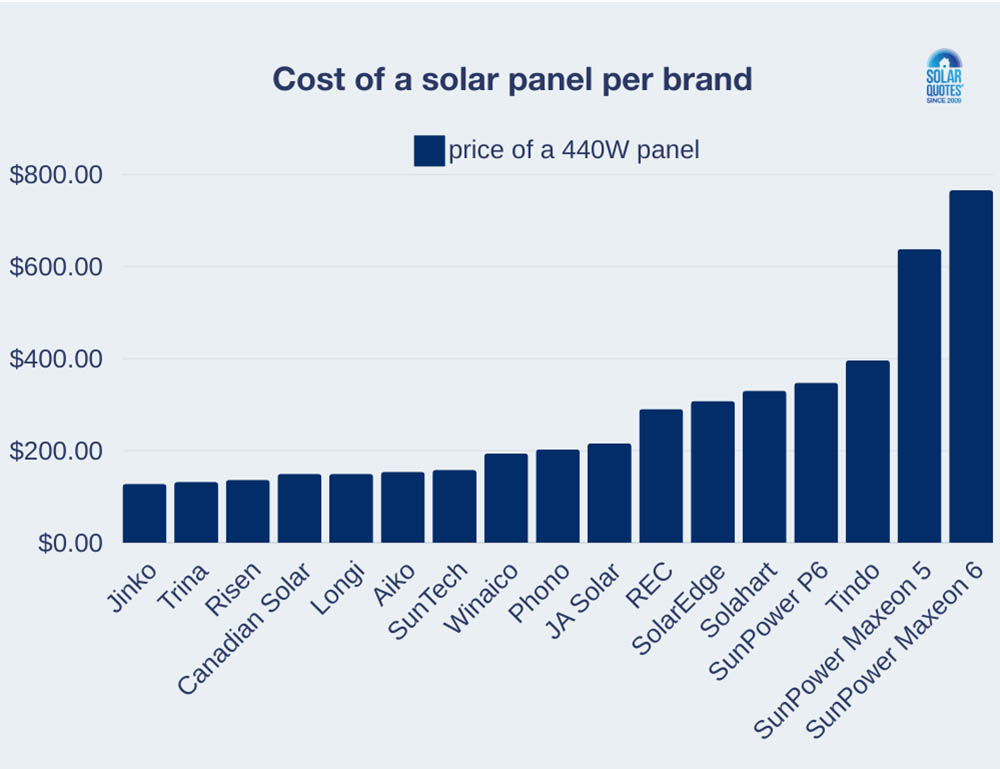
The brand of solar panel you choose plays a big role in the total cost of your system. In fact, the difference between a budget and premium panel can be as much as $500 more per panel. When you multiply that by 14–20 panels in a typical 6.6 kW system, the brand premium can add up fast.
Here’s an example. If a budget panel like Jinko costs around $130 and a premium one like SunPower costs over $700, the brand choice alone adds up to around $8,000 difference on a 14-panel system. That doesn’t include inverter, installation, or other hardware — just the panels themselves.
But what do you get for that extra spend?
- Higher efficiency – Premium panels can generate slightly more energy per square metre, which is handy if your roof space is limited.
- Lower degradation – Over 25 years, premium panels may lose only 5% efficiency compared to 10% for cheaper models.
- Better temperature performance – Panels with a lower Pmax temperature coefficient perform better on hot days.
- Longer and stronger warranties – Premium brands often include 25–30 year product and performance warranties, sometimes covering labour too.
- Reputation and support – You’re paying for a company with a proven track record, which can make a big difference if you ever need to make a warranty claim.
Of course, you don’t always need to go top-shelf. If you’re on a budget, there are some excellent value-for-money options from brands like Jinko, Trina, and LONGi. These panels are still high-quality, CEC-approved, and widely used by reputable installers.
The key takeaway: panel brand can shift your quote by thousands, but that premium may be worth it for the right home, especially if you value efficiency, longevity, and peace of mind.
What’s The Deal With The Solar Panel Rebate?
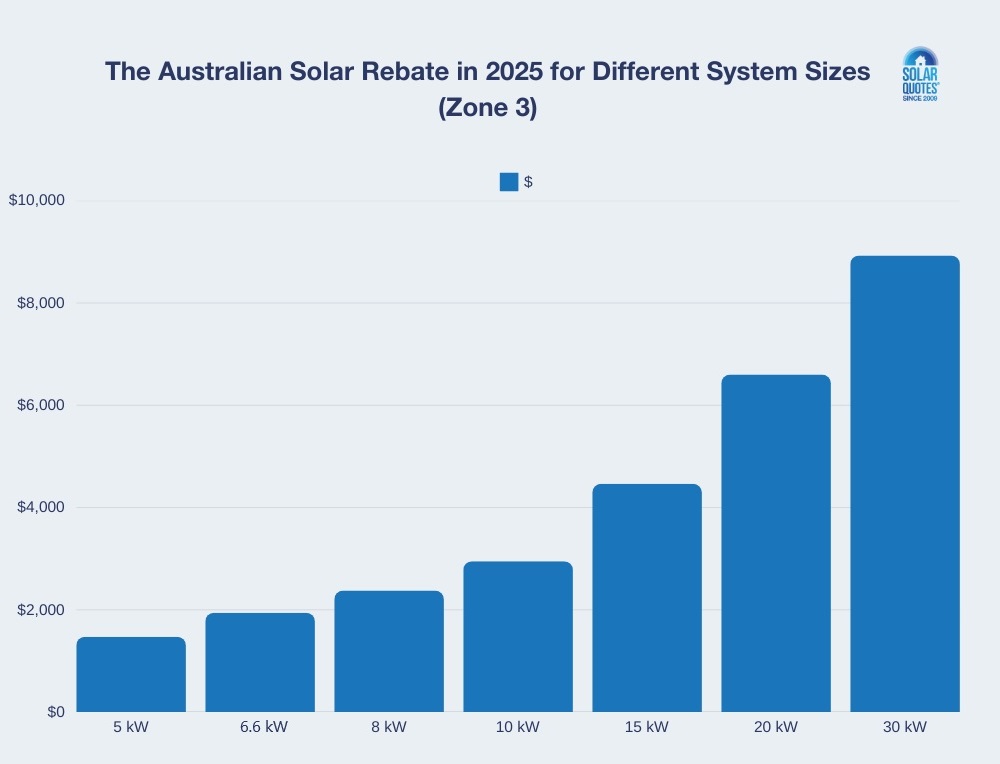
Australia’s solar rebate, officially called the Small-scale Renewable Energy Scheme (SRES), takes a significant chunk off the cost of installing solar. How much? Around $300 per kilowatt of solar capacity. For a typical 6.6 kW system, that’s about a $2K discount—and the best part? It’s applied upfront by your installer. No paperwork nightmares for you.
The rebate works by generating Small-scale Technology Certificates (STCs), which depend on your system size and location. Once you have determined those, you can calculate how many STCs you are eligible for with our solar rebate calculator. These certificates have a market value that fluctuates, and the scheme itself is set to gradually phase out by 2031, so it’s worth getting in sooner rather than later.
Still curious? We’ve broken it all down in plain English in our solar rebates page—check it out.
Is A Battery Necessary or Overkill?
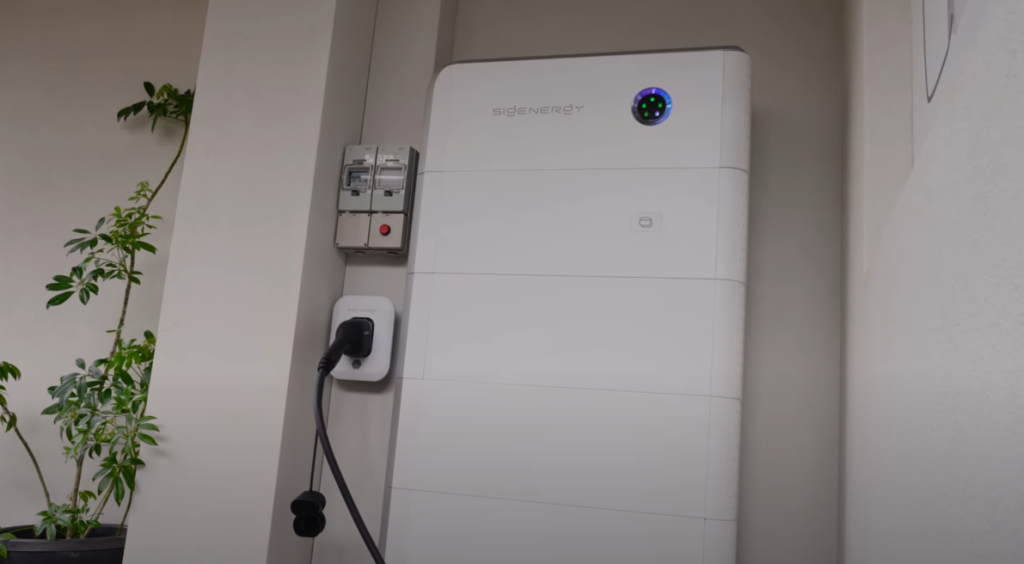
Even with falling feed-in tariffs (i.e. what your electricity company pays you for exporting surplus solar), solar without a battery still makes sense.
But adding a battery will get your bills even lower.
The easiest way to decide is to use our Solar Calculator. The results will break down the savings between solar and battery – so you can decide whether to pay the extra.
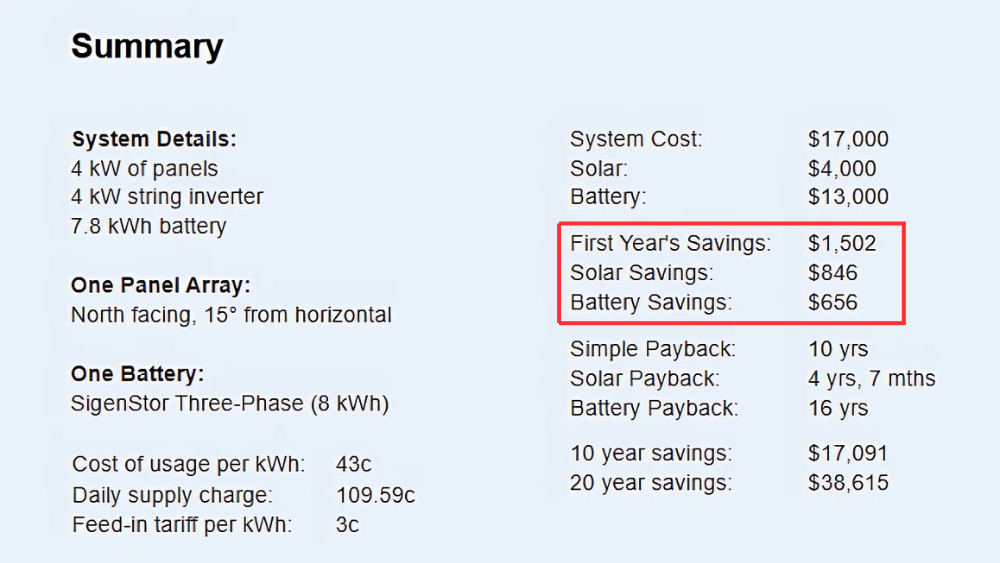
Specifications That Matter: Efficiency, Degradation, PMax
Solar panels have dozens of specifications. You can compare them on my solar panel comparison table. But as a consumer, I’d argue there are only three you need to know about:
Efficiency (%)
Solar panel efficiency measures the percentage of sunlight energy hitting a panel’s surface that is converted into electrical energy. The higher, the better. Today’s solar panels typically achieve efficiencies from 21% to 23%.
Why is high efficiency good? Well, the higher it is, the more watts of electricity you’ll get per square metre of panel, allowing a system to generate more energy from the same amount of roof space.
So, if roof space is at a premium or you just want super-duper PV technology, look into higher-efficiency panels. The good news is that, in 2025, good budget solar panels are as efficient as premium ones. A budget option like Jinko achieves an efficiency of 22.53%, which is comparable to premium brands like Winaico (23%), SunPower (22.80%) and REC (22.70%).
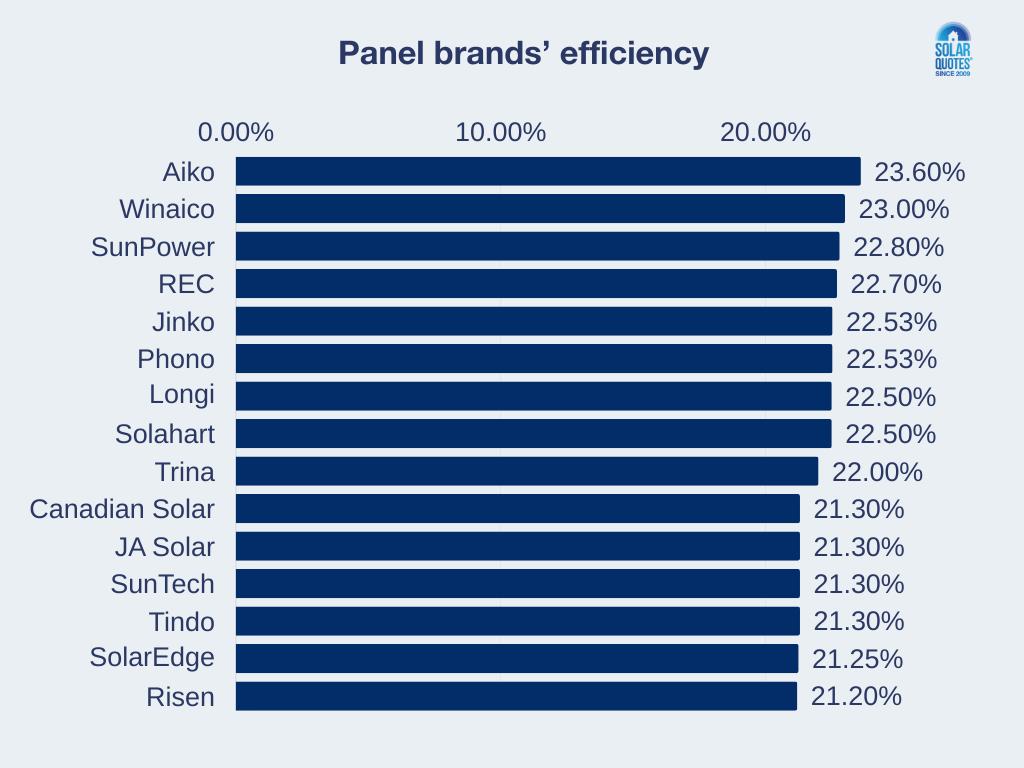
Degradation (% per year)
All solar panels become less efficient over time, but the degradation rate varies. A budget panel may degrade at 0.5% per year, while premium panels like REC or SunPower degrade at about 0.25% per year. Over 20 years, this translates to:
- Budget panel: 10% efficiency loss (e.g., 22% drops to 19.8%).
- Premium panel: 5% efficiency loss (e.g., 22% drops to 20.9%).
While “double the degradation” sounds bad. However, the difference in energy yield is only around 5% over 20 years.
If you value longevity and top performance, premium brands like REC and SunPower with lower degradation rates might be worth the investment.
PMax Temperature Coefficient (%/ºC)
Solar panels love light but hate heat because high temperatures reduce their efficiency.
Temperature Coefficient of Pmax — or just Pmax — tells you by how much. This will be around -0.35%/ºC for a average panel. The smaller this is, the better. For every degree over 25ºC a panel’s output will be reduced by this percentage.
REC panels provide the best Pmax at -0.24%/ºC. If you live in a hot climate and want maximum energy on hot days, Pmax is worth considering.
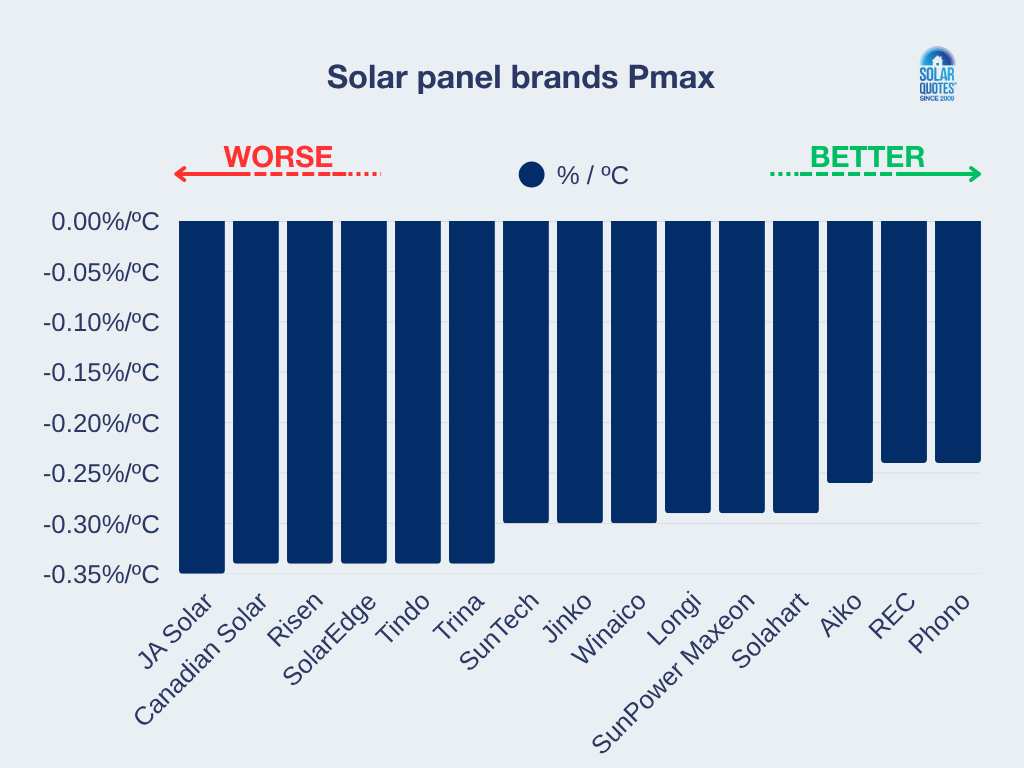
Solar Panel Warranties
Most panels should have at least a 25-year manufacturer’s warranty (also called product warranty) on the solar panels, which covers defects in workmanship and materials.
Pay close attention to the fine print of warranty docs. Ideally, you’ll want a warranty that will replace defective panels and cover labour costs. But the majority of warranties don’t promise this. Avoid any that say you have to send the panels away to make a claim. Also, consider the history and experience of both the panel manufacturer and the company installing them. Are they likely to still be around in 10 or 20 years if something goes wrong?
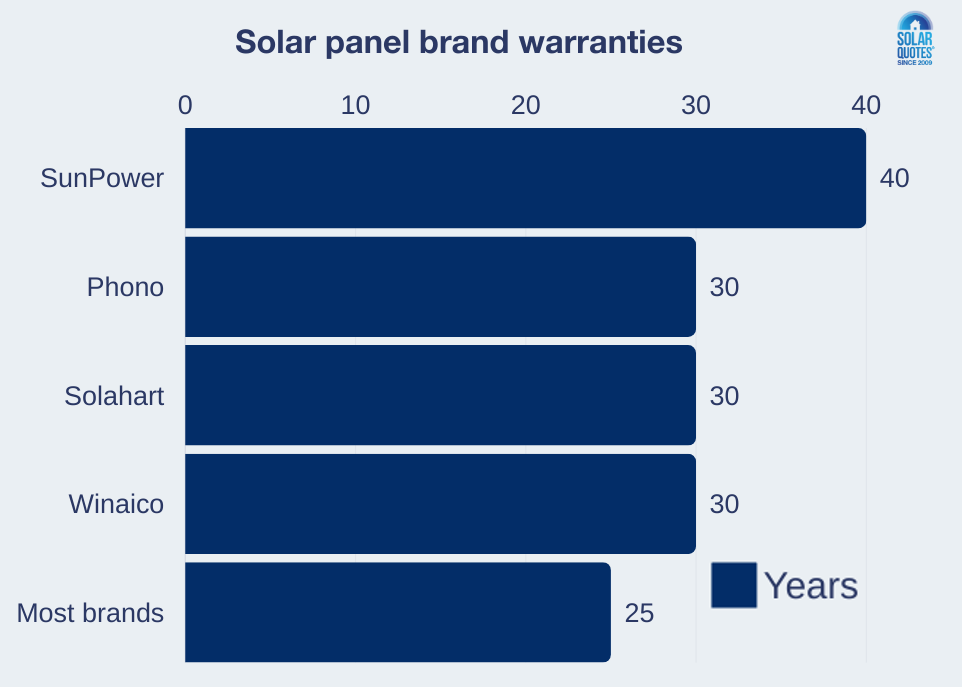
Finally, ensure the warranty isn’t tied to an expensive service contract. You don’t want to feel compelled to shell out $500 a year for a bloke to hose down your solar panels just to keep your warranty. By the way, this sort of warranty stipulation is likely unenforceable under Australian Consumer Law!
While Australian consumer law is strong and can require companies to provide support they don’t include in their warranties, it’s always good to have a warranty that promises comprehensive support, as you are less likely to have to fight to get it.
Country of Origin: Are Chinese Panels Crap?
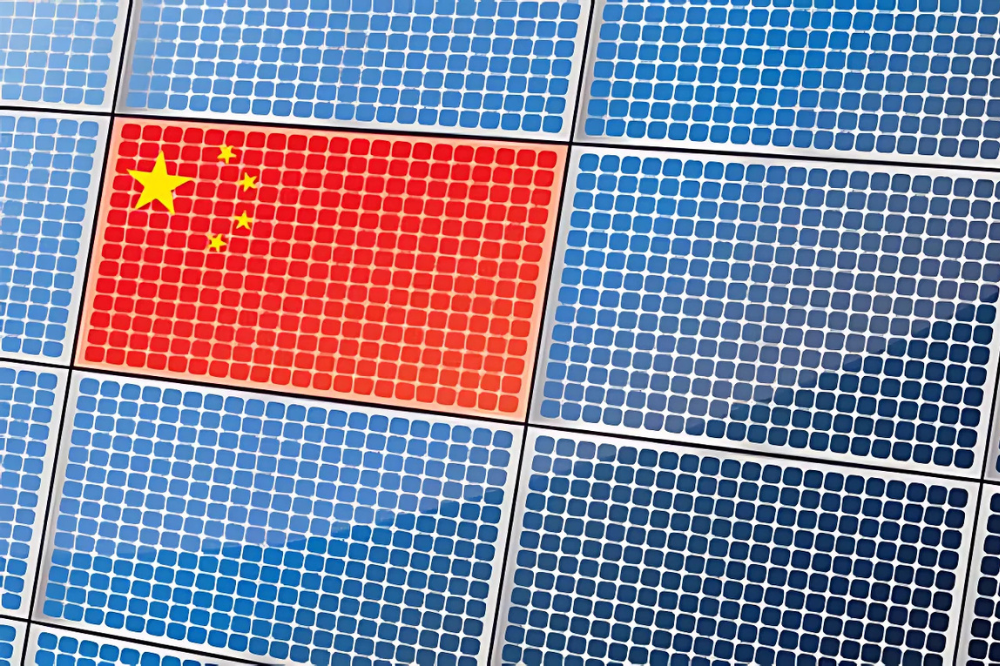
Some people insist the best solar panels are made in Germany, and all Chinese solar panels are crap. Follow that previous link for a deeper discussion on this, but I find that talk borderline xenophobic.
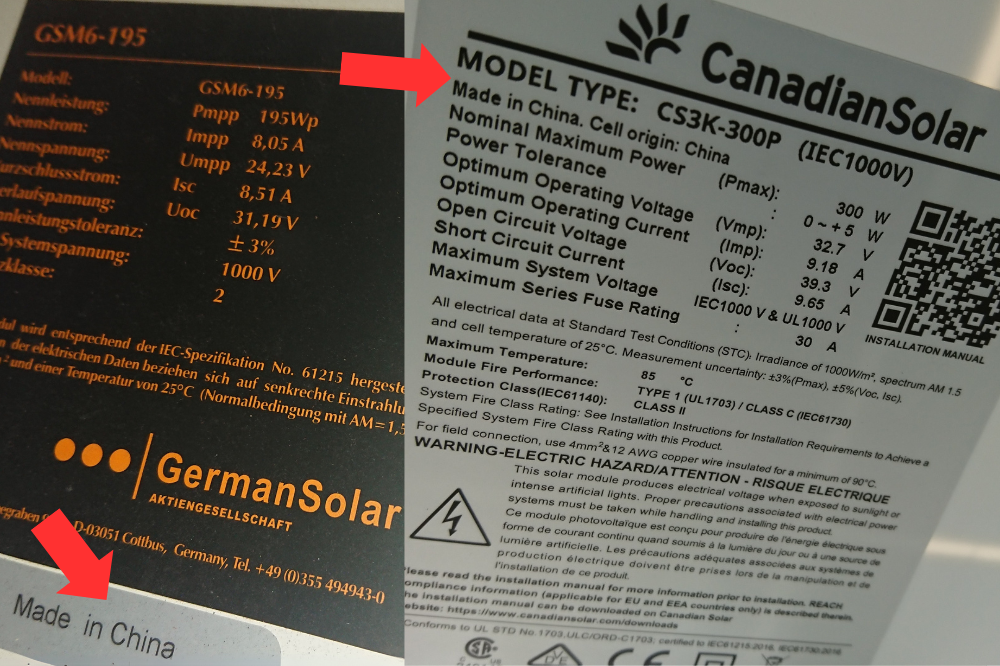
You may have Pauline Hanson-style reasons for not buying Chinese products. However, as far as quality is concerned, many Chinese brands are world-class. Some are crap, but if you think “Chinese” is synonymous with “low quality”, what do you think about your iPhone, Macbook Pro, or Tesla Model 3? Yep, made in China …and they’re all high-quality, sophisticated devices.
Which Budget Solar Panel Brands Are Reliable?
Here are the brands I currently recommend. On the left side you can see the budget options, on the right the more premium brands. You can find reviews from Australian owners of all these brands (and others) in my solar panel reviews section.
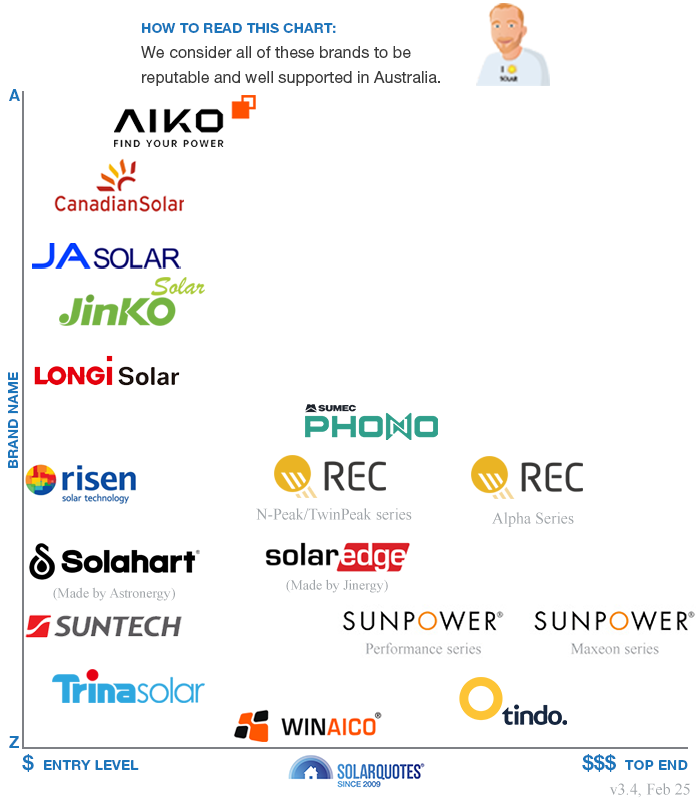
Is My Roof Suitable for Solar?
Most Aussie homes are solar-ready, but not all rooftops are created equal. Here’s what matters:
Sunlight Access
North-facing roofs get the most sun, but east, west, and even flat roofs can still work well. South-facing? Still viable, but with reduced output. Read all about it on our solar panel direction guide.
Shading
Trees, chimneys, neighbouring buildings or roof clutter (like whirlybirds and vents) can reduce output — sometimes dramatically. Good installers will model this using shade analysis tools.
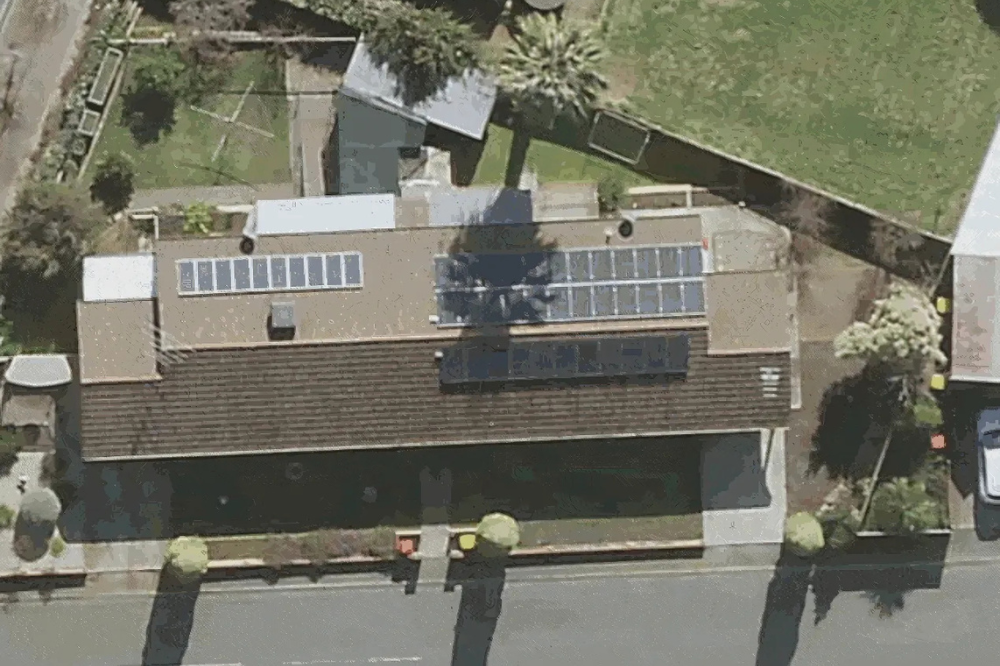
Remember: Shading changes throughout the year as well. As the days grow short, the shadows grow long. Make sure you know where the shade will fall.
Roof Size and Shape
A standard 6.6 kW system usually needs about 30 m² of usable space. Big open areas are easiest, but even complex roofs can often fit a decent system using multiple arrays.
Roof Condition
If your roof is old or due for repair in the next few years, fix it before installing solar. Removing and reinstalling panels later is expensive.
Roof Material
Metal, tile, Colorbond — all fine for solar. That said, tiled roofs take a bit more effort, and brittle tiles break easily which slows down the install (and causes some installers to whinge).
Still unsure? A good installer will assess all of the above and design a system that makes the most of the sun your roof gets — without pushing a sale if your site’s just not up to it.
How Many Solar Panels Do I Need?
There’s no magic number. Asking how many panels you need is a bit like asking how many bricks it takes to build a house — it depends on what you’re trying to build.
The average Australian home uses about 16–20 kilowatt-hours per day. Since a 1 kW solar array typically produces around 4 kWh/day, simple maths says a 4–5 kW system would cover average usage — but dealing in averages is only for dim door-to-door salespeople. Instead, you should size your system for the cloudiest winter day.
Modern systems are rarely smaller than 6.6 kW. Why? Because:
- Winter sunlight is weaker — you’ll want the extra capacity then
- Electricity needs are rising (think EVs, home batteries, electric heating)
- Excess solar is useful — for hot water, batteries, or export
The best system is usually the biggest one your roof (and budget) allows. Extra panels offer great bang for buck, and export limits or low feed-in tariffs can often be managed smartly with batteries or load shifting.
As of 2025, most solar panels are rated around 440 W each. That means a typical 6.6 kW system uses about 15 panels, covering roughly 30 m² of roof space.
For context: in 2008, you’d need 110 panels to get 6.6 kW using the thin-film tech available back then. We’ve come a long way.
So don’t get too hung up on panel count. Focus on the total system size (kW), and let your installer tailor it to your roof, budget, and energy habits.
What Will Solar Panels Look Like on Your Roof?
Some people prefer the look of certain types of solar panels to others — this is just down to personal preference. For standard panels, the main choices are:
- Silver frames.
- Black frames
- All black panels
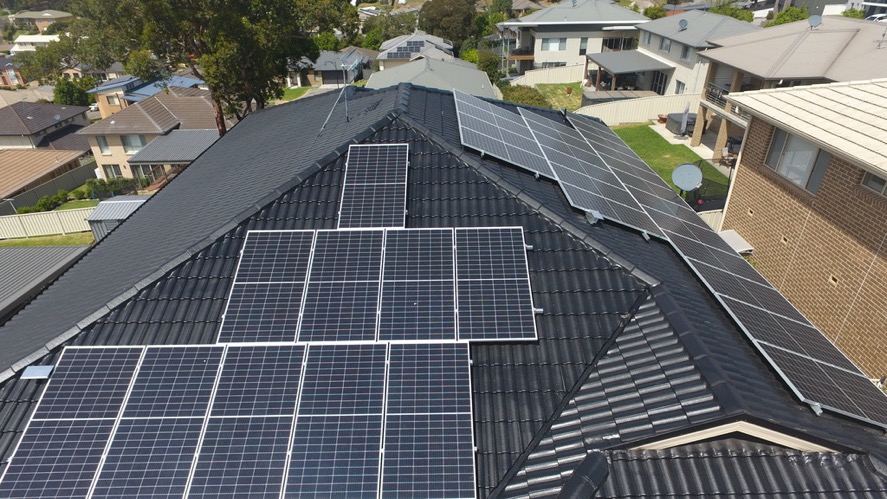
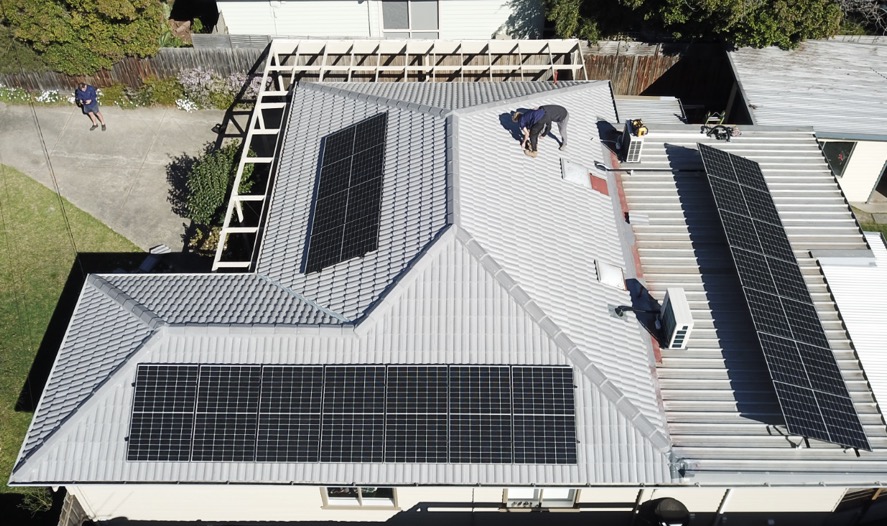
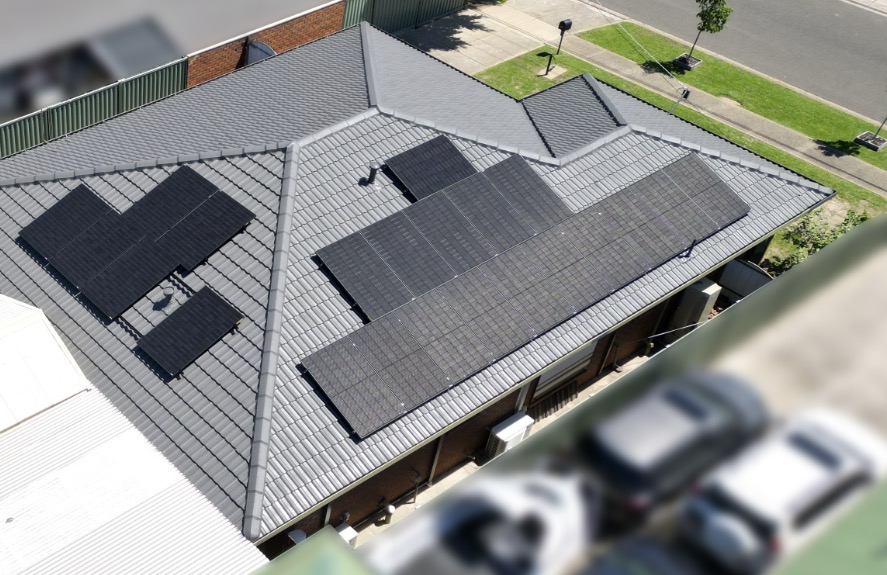
Because they get a little hotter, all black panels have slightly worse performance than otherwise identical ones. But the difference is very minor.
Some suppliers can integrate the panels into your roof; others can supply solar roof tiles. And if you’ve got a whacky, curved roof, you can even get flexible solar panels! However, the sleek aesthetics of building-integrated solar power (BIPV) come at a price, of course.
Generally, choosing a more “utilitarian” look will be cheaper. But first, check how visible your solar panels will be from the ground. Unless you want to look good for helicopters flying over, there’s no point in paying for ones that look good if no one ever sees them.
How Long Do Solar Panels Last?
A well-made solar panel will typically last at least 25 to 30 years, but that doesn’t mean it suddenly stops working after that time. Solar panels don’t have moving parts, so they’re highly durable and rarely fail outright.
Instead, what happens is that solar panels slowly produce a bit less power each year—a process known as degradation. A good panel only loses around 0.5% of its original output annually. That means after 25 years, it will still generate approximately 85–90% of the electricity it did when brand new.
The warranty period offered by reputable brands typically matches or exceeds 25 years, providing reassurance that your panels are designed to last. But remember, warranty length alone doesn’t guarantee reliability—it also matters that the manufacturer and installer have good reputations and histories of honouring warranty claims.
Realistically, you can expect quality solar panels to continue working well beyond their warranty periods—sometimes 30 years or more. To maximise your system’s lifespan:
- Choose panels from reputable brands.
- Get your panels installed by experienced, trusted installers.
- Perform basic maintenance, such as periodic cleaning and visual inspections.
- Monitor your system’s output through the provided app to catch and fix any performance issues early.
Bottom line: solar is a long-term investment, and with good choices upfront, it will reliably power your home for decades.
How Green Are Solar Panels?
Solar panels provide a huge environmental benefit over burning fossil fuels by generating energy from sunlight. But do some provide more benefit than others? The answer is yes. But, provided they are reliable, the difference is very small compared to the drawback of not having solar.
If your goal is the lowest greenhouse gas emissions possible from your solar, I recommend looking at the following:
- Do the panels have a reputation for reliability and a long manufacturer’s warranty? The largest waste of solar resources occurs when cheap and shoddy panels have to be replaced after only years of use rather than multiple decades.
- Are the panels high-efficiency? These require less material per watt of panel capacity and so, all else equal, result in lower emissions from manufacturing and transport.
- The manufacturer’s own claims about emission reductions. Some companies are more committed to cuts than others.
Can Solar Panels Be Recycled?
Yes, solar panels are recyclable, but Australia is still building the infrastructure to make this economically practical nationwide.
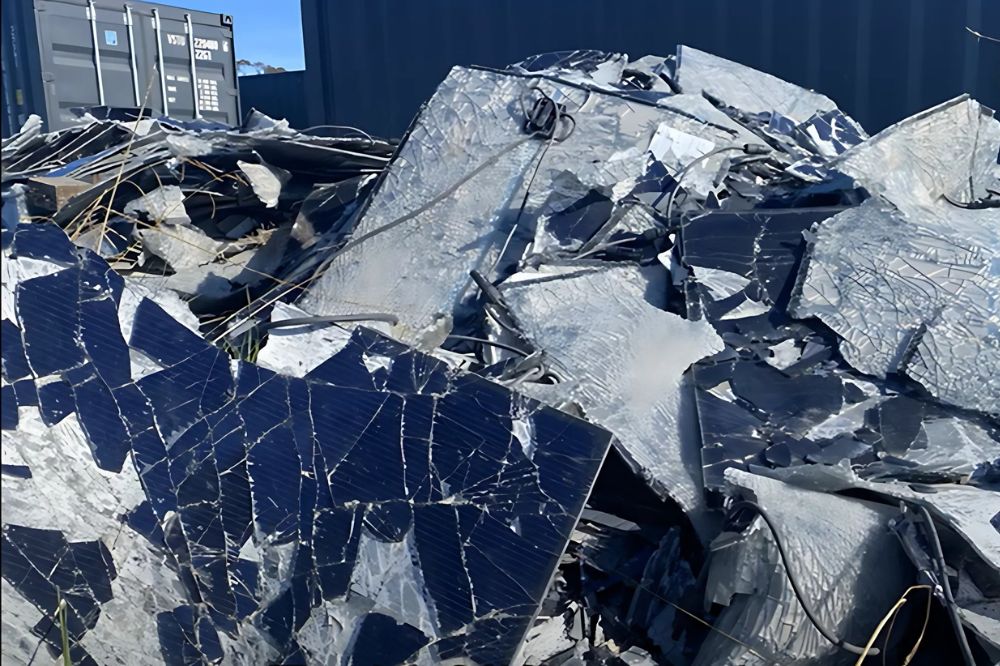
Currently, recycling a solar panel in Australia costs around $28 per panel, significantly more than sending it to landfill (approximately $4.50 per panel). Because of this, many old panels unfortunately still end up as waste. However, the federal government is developing a solar panel product stewardship model to shift the financial burden of recycling from end-users to producers and importers.
The Victorian, South Australian and the ACT governments have banned the disposal of solar panels in landfills. If you want your panels recycled responsibly, you typically need to arrange this through specialist solar recycling companies and pay them directly.
If sustainability is important to you, consider purchasing lead-free solar panels, which are easier and safer to recycle. Currently, REC is one of the few manufacturers offering these, although more brands are expected to follow.
As recycling processes improve and facilities expand, these costs should come down, making responsible solar recycling the norm rather than the exception.
What Maintenance / Cleaning Do They Need?
Solar panels are impressively low-maintenance. They have no moving parts and are designed to withstand the harshest Aussie weather — from hailstorms to heatwaves.
In most cases, rainfall is enough to keep panels clean. But if you live in a dry, dusty area, an occasional clean can help maintain peak performance, especially during long dry spells when dirt and grime accumulate.
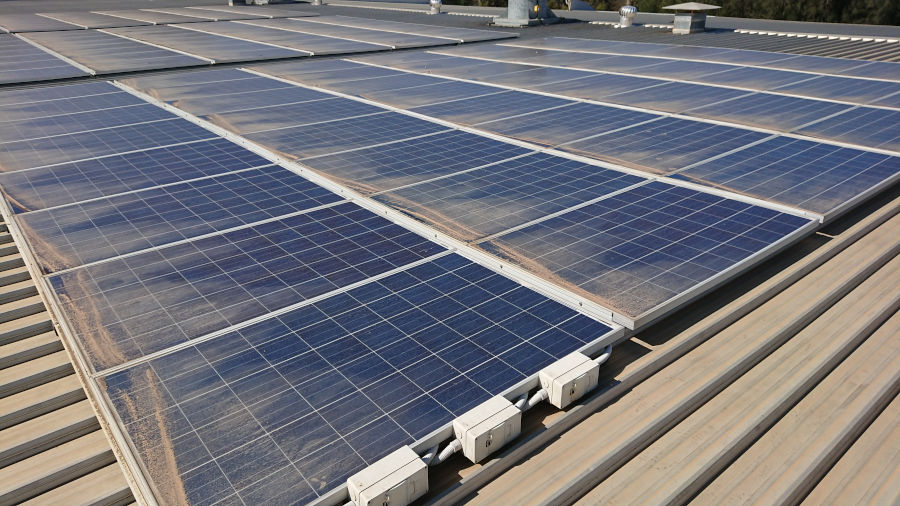
How often? For most homes, a quick clean every year or two is plenty. You can DIY if it’s safe to access your roof, or hire a professional if not. Just be sure to avoid high-pressure hoses and harsh chemicals — a soft brush, hose, and soapy water are usually all you need.
We go into more detail in our full guide here: Solar Panel Cleaning: Why, When and How To Do It.
Note: if someone tries to sell you an annual $500 solar cleaning contract in order to maintain your warranty — walk away. That’s usually marketing BS. Warranties can’t require unnecessary servicing under Australian Consumer Law.
What Are The Best Solar Panels in 2025 According to Aussie Installers?
I also asked installers in the SolarQuotes network for their recommendations – what they would install on their own rooftops? Discover what they voted the best solar panels in 2025. You’ll notice that these brands also appear on my recommended brand chart above.
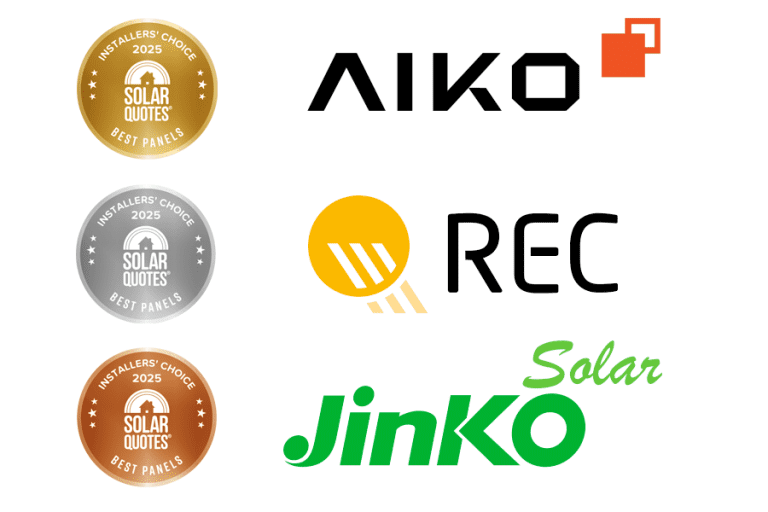
You can find reviews from Australian owners of all these brands (and others) in my solar panel reviews section.
FAQs
Will the panels damage my roof?
No.
While there is some chance the people doing the installation work might cause minor damage simply from foot traffic, properly installed solar arrays pose no risk to the roof.
Care must be taken during the install to make sure there’s no leaks created (such as cracked tiles) but the only damage we’ve seen “created” by a solar array is when a severe infestation of pigeons, and their nests, causes corrosion and water leaks.
Will the panels perform as promised?
In order to claim STC incentives, solar installers are obliged under the rules to provide an estimate of yield broken down over 12 individual months.
They make assumptions about shade on your premises and drop that information into a quoting program that accounts for panel model, tilt, orientation, electrical losses & inverter efficiency.
Effectively they promise the system will deliver XX kWh for each month and you can check this via the monitoring app that comes with all solar power systems.
If the system doesn’t perform to specification, you have documented grounds for a warranty claim.
Will they work in blackouts?
Standard grid connect solar does not work in a blackout.
However, if you have a solar power system equipped with a battery, it can store energy for use after sundown or during a blackout.
This type of setup is often referred to as a “hybrid” solar system because it uses energy from the power grid, from the solar array and from the battery depending on the time of day and the electrical demand in the home.
There are some exceptions like the Fronius Gen24 which offers a limited power supply without a battery, when it’s sunny.
Other hybrid systems will only function to store energy when mains power is available. Despite having a battery, they may not offer blackout protection without specifying extra hardware.
If you require back up you must document exactly what you need to function during an outage, as most systems don’t have enough capacity to back up the entire house.
Will they make my roof leak?
No.
The only time you get roof leaks from solar power is when you use cheap shoddy installers, or have a massive buildup of bird nests under the array.
Both situations are easily avoided.
Should I buy solar panels from a door-to-door salesman?
NO.
There’s a good reason that doorknockers are already banned from incentives provided by Solar Victoria.
Should I put solar panels on an old roof that needs repairs?
Ideally you should make any repairs needed to your roof before solar goes on.
While solar arrays aren’t impossible to remove and replace, the labour involved to rework an array can cost as much as a whole new system.
If, perhaps, you have a 5-year horizon for demolishing a roof and building an extension, it can still be worth installling solar.
For owners of tile roofs, it can be beneficial to plan for solar & have mounting brackets installed first. Then have roof repairs made with hips & ridges repointed as necessary, followed by the install of racking and solar panels.
Can you get solar panels that work in the shade?
Not really.
Solar panels need bright light to convert into electricity.
While they don’t respond well to direct radiant heat, sufficient sunshine is essential to get any meaningful yield.
While some panels are marketed as “shade tolerant”, the degree to which they’ll work with different amounts of shade, in diffuse or hard-line patterns, is open to many marketing claims.
For very shady roofs solar can still be well worthwhile but many installers recommend micro inverters or optimisers.
How is solar panel tech improving?
While solar cells’ basic efficiency at turning light into electricity has improved incrementally, much of the improvement has simply been better packaging.
Silicon wafers have grown bigger, cell sizes have increased, corners previously cut off have been squared up & gaps between individual cells have been closed down, all giving greater density under the glass.
Along with increased panel sizes, which offer more glass and less frame, output per square metre of array deployed has increased significantly.
While there used to be a few percentage points between the best available panels and the also rans, most panels are now very close in performance terms.
I heard solar panels are made by slaves in China?
Something like 90% of the world’s PV solar is made in China, or by Chinese companies operating in other countries to avoid trade barriers.
While the world doesn’t have complete transparency from China about their internal labour conditions, solar manufacturers are responsive to customer pressure.
All the panel brands recommended by SolarQuotes have made documented statements about modern slavery and they can be found on the second-last row of our panel comparison table.
If you’re ready to get pricing on a system, you can get up to 3 solar quotes via my service from Australian installers I have personally pre-vetted and trust.